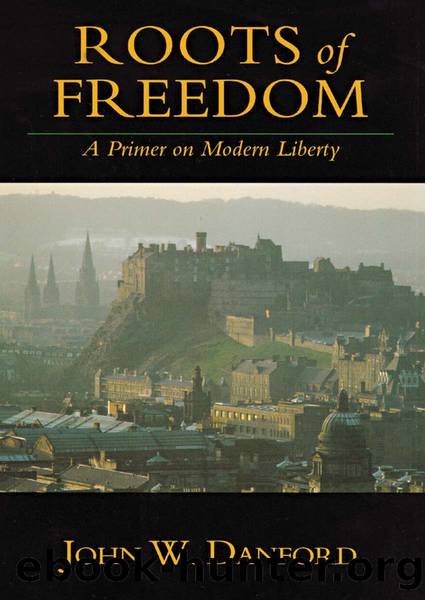Roots of Freedom by Danford John W.;

Author:Danford, John W.;
Language: eng
Format: epub
Publisher: Intercollegiate Studies Institute
Chapter 9
COMMERCE AND LIBERTY
John Lockeâs profound teaching about the nature of man and the basis of legitimate political order is the clearest articulation of the principles of liberal individualism. He taught that human beings confront a nature that, left to itself, offers only scarcity, want, and insecurity. Human beings can escape this condition only by yielding some of their limitless but insecure rights by a social contract to live in a community under law, which makes it possible for them to preserve themselves, secure their genuine liberties, and produce the material goods needed for life, all of which Locke calls âproperty.â In many of these principles Locke followed earlier thinkers such as Thomas Hobbes, but unlike Hobbes, Locke was deeply concerned about the power of the government itself. Governments are legitimate only if they rest on the consent of the people, according to Locke. But this principle alone is not enough. Men need to secure their liberties against all centers of power, and that includes the government itself.
Lockeâs teaching anticipated the slogan that âeternal vigilance is the price of liberty,â for he believed the best safeguard against oppressive or tyrannical rulers is a citizenry educated to understand their rights and the principles of legitimate government, and aware of their âright of rebellionâ in case tyrannical rule exceeds its proper bounds. In fact, he maintained that the right of rebellion is itself âthe best fence against rebellion.â Locke insisted that the instability that may result from such a doctrine cannot ever be avoided: âThis is an Inconvenience, I confess, that attends all Governments whatsoever, when the Governours have brought it to this pass, to be generally suspected of their People; the most dangerous state which they can possibly put themselves in; wherein they are the less to be pitied, because it is so easie to be avoided; It being as impossible for a Governour, if he really means the good of his People, and the preservation of them, and their Laws together, not to make them see and feel it, as it is for the Father of a Family, not to let his Children see he loves, and takes care of them.â1
One of the clearest statements of Lockeâs understanding of government is found in the concluding chapter of his Second Treatise: âThe Reason why Men enter into Society, is the preservation of their Property; and the end why they chuse and authorize a Legislative, is, that there may be Laws made, and Rules set, as Guards and Fences to the Properties of all the Members of the Society, to limit the Power, and moderate the Dominion, of every Part and Member of the Society.â2
An additional means of protecting against âarbitrary or excessiveâ power was suggested by Lockeâs great successor, the French philosopher Charles Secondat, Baron de Montesquieu. Montesquieu is best known for his remarkable study, Spirit of the Laws (Esprit des Lois), the most famous part of which is his teaching about the separation of powers. âSeparation of powersâ refers to
Download
This site does not store any files on its server. We only index and link to content provided by other sites. Please contact the content providers to delete copyright contents if any and email us, we'll remove relevant links or contents immediately.
The remains of the day by Kazuo Ishiguro(8378)
Tools of Titans by Timothy Ferriss(7805)
Giovanni's Room by James Baldwin(6803)
The Black Swan by Nassim Nicholas Taleb(6761)
Inner Engineering: A Yogi's Guide to Joy by Sadhguru(6439)
The Way of Zen by Alan W. Watts(6288)
Asking the Right Questions: A Guide to Critical Thinking by M. Neil Browne & Stuart M. Keeley(5353)
The Power of Now: A Guide to Spiritual Enlightenment by Eckhart Tolle(5329)
The Six Wives Of Henry VIII (WOMEN IN HISTORY) by Fraser Antonia(5234)
Astrophysics for People in a Hurry by Neil DeGrasse Tyson(4998)
12 Rules for Life by Jordan B. Peterson(4159)
Housekeeping by Marilynne Robinson(4057)
The Ethical Slut by Janet W. Hardy(4036)
Skin in the Game by Nassim Nicholas Taleb(3965)
Double Down (Diary of a Wimpy Kid Book 11) by Jeff Kinney(3921)
Ikigai by Héctor García & Francesc Miralles(3889)
The Art of Happiness by The Dalai Lama(3844)
Skin in the Game: Hidden Asymmetries in Daily Life by Nassim Nicholas Taleb(3720)
Walking by Henry David Thoreau(3681)
